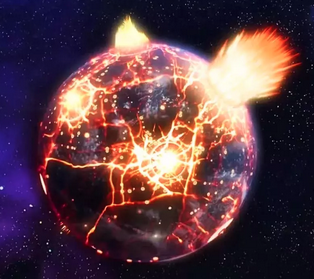We are most free when we appreciate the beauty of our surroundings, being ever mindful and present.
- 10 Posts
- 23 Comments
Yes. I'm from the USA and in my late twenties. I learned how to drive on an old Jeep Wrangler on a farm.

 ·1 year ago
·1 year agoj2me looks relatively more modern? What protocols were the old-school Nokia games like Snake written in?

 ·1 year ago
·1 year agoLike... this kind of stuff?
https://www.youtube.com/watch?v=c9MiGCQf1bY

 ·1 year ago
·1 year agoYour argument would be very convenient for socialists or communists looking for an explanation that blames war on the rich. Unfortunately I do believe it is a gross oversimplification that is neither useful nor particularly true.
While it is true that the military industrial complex has gotten out of control in many western countries since World War II, the argument that private industry is the true beneficiary and intentional instigator of war can be readily disproved. Rather, this assumption made by many on the left is born from a partial realization of the truth that war is about resources, but the argument quickly loses the plot thereafter. War is indeed about resources, both physical and psychological in nature, or put more succinctly, war is about security. Each state actor responds and reacts as necessary in order to ensure their legitimate security needs are met.
This view was famously espoused by political scientist Kenneth Waltz when he built upon the theories of classic realists such as Machiavelli. Whereas Classic Realism suggests that war is about power, Waltz takes it one step further with Structural Realism and gives us an academic framework to understand the balance of power and the motivation behind state actors. Waltz suggests that these power shifts are the result of states reacting to perceived threats in order to ensure security. For instance, in the Structural Realist view, one could say that Russia's invasion of Ukraine is an attempt to gain security in response to a perceived NATO threat. Using this theory, we could similarly suggest that the US invasion of Afghanistan was a move to obtain greater security in a region that threatened the US hegemony (though the argument starts to break down here when we distinguish between the Taliban and Al Qaeda as neo-realism does not explain the action of non-state actors).
While it would be fair to say that in many western countries, the military industrial complex has acquired a massive amount of power and control over the government, it can hardly be said that war exists only for the benefit of war profiteers who help with nation building. The most obvious proof of this is the fact that war long pre-dates crony capitalism, nation building, and the military industrial complex as a whole. Furthermore, while lobbyists do hold an incredible amount of power, they are certainly not the rulers and final decision-makers of our country. Foreign policy is set by a number of diverse lawmakers and civil servants across the political landscape, but the withdrawal of US troops from Vietnam, which was opposed by the Military Industrial Complex, as well as the US intervention in Somalia which was wholly a humanitarian mission, are proof that they do not make the final decisions.
Our democracy certainly has many problems. Money pollutes our campaigns, and lobbyists hold far too much power. Trump's five year lobbying ban for former US officials was a good start until he repealed it. We need more measures that limit lobbyists, and limit the ability of ANY politician or political party from totally derailing our country by putting us into unnecessary wars. We need more checks and balances in our system that prevent career politicians from fucking the rest of us over. And dammit, we definitely need to elect some better people than these jokers we've been electing lately. However; war is far more complex than you suggest.

 ·1 year ago
·1 year agoBush should be in jail for Iraq.
Regarding Afghanistan, we should have focused exclusively on counter-insurgency and let the Loya Jirga do its thing without US interference.

 ·1 year ago
·1 year agoPay off my debt, give 10 million to churches and charities of my choice, give a million to my parents and another million to my in-laws, give myself a million, and take the remaining 87 million and start a non-profit that aims to fight climate change and eradicate world hunger.
If there were a lot more conservatives or libertarians, the OP might not think there are a lot of communist posters here. Because there are a lot of left leaning people here who upvote anti-capitalist posts and comments, it is easy for the OP to reach the conclusion that there are a lot of communists. My three points explain 1) why the platform was already predisposed towards leftist thought in general, 2 and 3) why there are not a lot of right leaning ideas to balance out the ratio.
-
Tankies made the software.
-
Conservatives left Reddit after The Donald got banned, and the bulk of the users on Lemmy came from Reddit.
-
Libertarians are busy arguing over New Hampshire's twitter.
-

 ·1 year ago
·1 year agoI yearn to be free
To plant a tall tree
Or maybe five or fifty
A greener world would be nifty
/
Power corrupts
So why should we bother
With coups so abrupt
And Dictator Father?
/
Yet democracy still
Gives me a chill
Tyranny of the masses
Why the rose colored glasses?
/
Corporate greed
Is not immune
From society's bleed
Into authoritarian noon
/
So what, then? A king?
Or anarchy's kiss?
How do we give up the bling?
Live a life full of bliss?
/
The truth lies inside
The life we observe
Is the one that we chose
And thus, what we deserve
/
If we want to be free
Change from a few's not enough
Not just a million and three
But collectively, all of us

 ·1 year ago
·1 year agoBig media doing what big media does best.

 ·1 year ago
·1 year agoGovernment doing what government does best… stifling innovation in the name of “protecting our children” while heroin dealers go free on the streets. Utter nonsense!!
edit: spelling, thanks @argv_minus_one@beehaw.org

 ·1 year ago
·1 year agoAny good reading on what social change would look like in order to achieve the ideal society to address climate change?

 ·1 year ago
·1 year agoI have, and I've also skimmed much of AR6. It seems to me like even in the worst case scenario human extinction is unlikely and most climate scientists are not doomers? I'm not saying we should do nothing, I'm saying I believe there is still hope to avoid human extinction and even for humanity to eventually recover and find a different, more renewable path (granted it might be after a century or two of returning to tribalism). I do think the future will necessarily involve an abandonment of our modern infrastructure and extreme de-urbanization, and that the sooner we do it the more likely Florida won't be underwater. I also think as terrible as it will be, food shortages and the trend we're already seeing of decreasing birth rates, combined with the near-term depletion of fossil fuels, will force this change rather humanity wants it or not.

 ·1 year ago
·1 year agoThanks for the explanation, this does make total sense. If I look at it from a short term lens then yeah I can see where people are having trouble accepting that the next 50 years will look nothing like the prior 50. I also agree not enough people are trying to solve the problems and climate deniers are a huge part of the problem. Is there a way I can use my perspective to contribute to solving the problems without giving in to fatalism?

 ·1 year ago
·1 year agoI wasn't aware of the term "Collapse Aware" until today and I don't understand. Yes, I know right now we are not on track to meet climate targets, which means there is an increasing possibility that in the next 100 years we will see an increase in severe weather events and especially coastal flooding. Yet the probability is the practical people, rather they accept the root cause right away or not, will develop solutions to many of these problems. Electric vehicles will continue to improve, and someone will solve the battery waste problem. We will develop better anti-flooding technology. And we are already seeing a trend where younger people are more likely to accept climate realities, and acceptance is the first key to change.
I think it is likely that in the next 100 years there will be substantial loss of life (especially in coastal regions) and probably another great depression and another war, but these sort of events are fairly common throughout history. However; the world will adopt to the new challenges and eventually solve them. Yes, the future will look different, but looking at the past it shouldn't be a surprise. Industrialization was just a stage in our journey and its end doesn't necessarily mean a societal collapse.
Mine would have to be Penpal.
https://creepypasta.fandom.com/wiki/Penpal
I guess this may be standard, but I'm running unit tests as part of my CI. Integration tests that can't be mocked go in the CD pipeline. For automated UAT, I have a branch on the CD pipeline that runs on the agent after a deploy, but in order to make the agent more agnostic I am toying with the idea of running the tests on a VM or on the deployed location.


I am impaled by the edge of the couch.